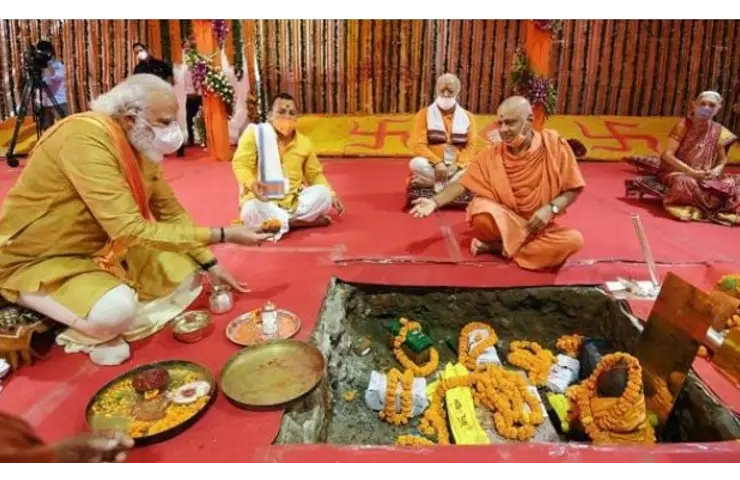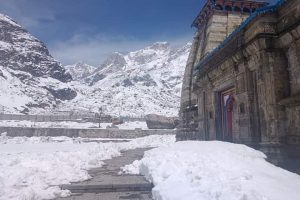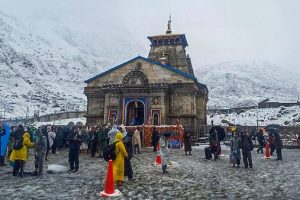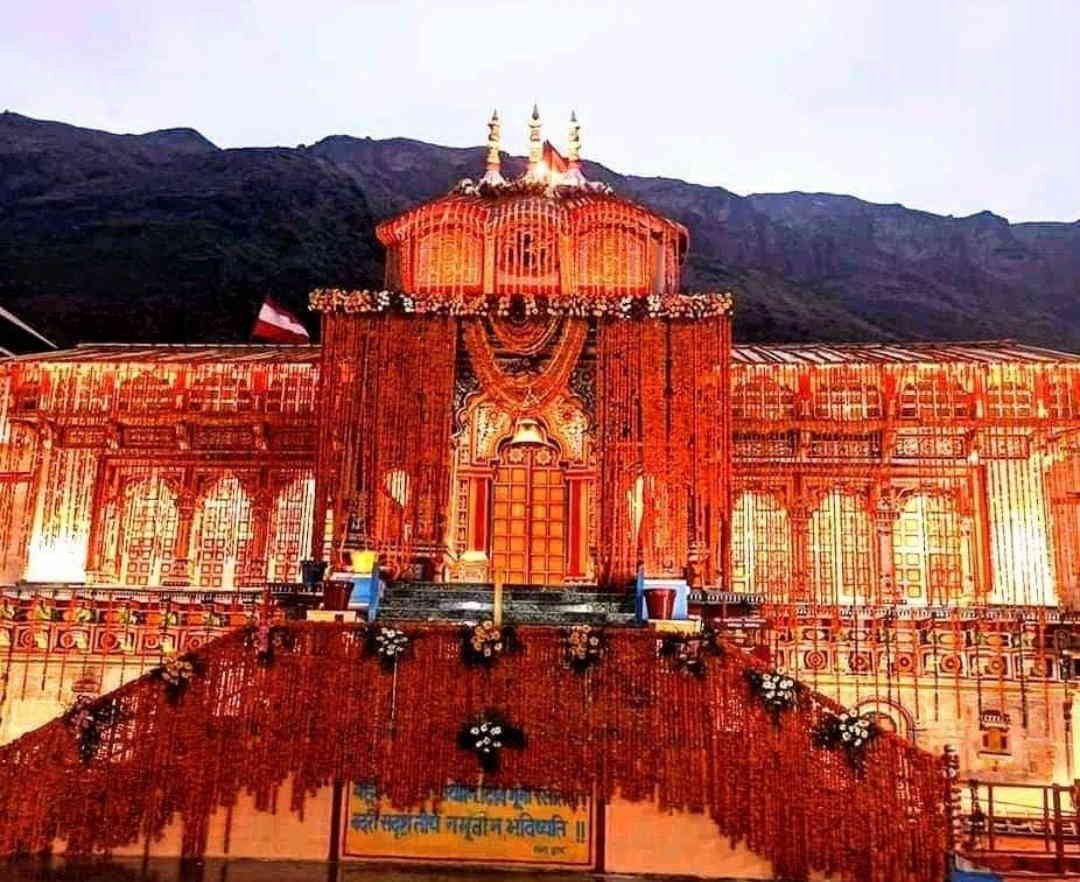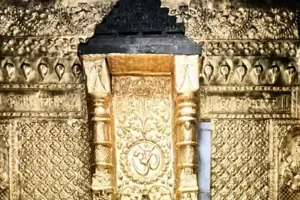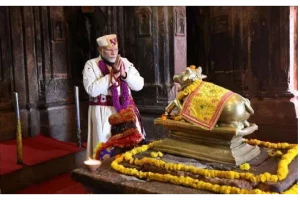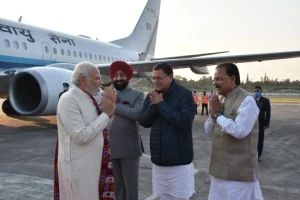Prime Minister Narendra Modi, who completed 20 years in office, first as Chief Minister of Gujarat and then as Prime Minister of India, started and finished several projects of national importance and embarked on various transformational initiatives.
However, it is his feats in the area of removing the excesses of the 1,000 years of invader rule, which needs to be told. As a leader well versed with the nuances of our civilizational struggle, PM Modi is aware of the role played by sacred Hindu temples in our millennium long struggle and their importance for the dharmic resurgence and revivalism efforts, underway ever since he arrived on the governance scene of India.
Before PM Modi, the Indian state turned its blind eye towards all kinds of temple restoration efforts. The sheer neglect by the previous governments dented the spiritual pride of the country and contributed greatly towards its waning during previous decades. Much of the reason lies in the events that followed KM Munshi led efforts to restore Sri Somnath Temple.

“Reconstruction of Somnath was then but the nebulous dream of a habitual dreamer”- those words of late KM Munshi turned a largely regional issue of Sri Somnath Temple to one of national and Hindu pride. Nehru’s dislike for temple reconstruction was well known. It is clearly evident from his comments to Munshi: “I do not like your trying to restore Somnath. It is Hindu revivalism.”
But much to his opposition, India embarked on the rebuilding and renovation of Somnath Temple. When time came for its inauguration, Nehru tried to stop Dr Rajendra Prasad from going but he failed. Although Sri Somnath temple was restored but it remained the only restoration effort for a long time. But the situation began changing only after Modi’s arrival.
During last 20 years, PM Modi played a leading role in the rejuvenation and renovation of several temples across the country. The scale and the scope of his civilizational repair initiatives expanded considerably after he moved from the state to the centre as PM in May 2014. The legacy that he is creating through his work has placed him in the same league as the great Hindu Queen Ahilyabai Holkar of 18th century, known for her pioneering temple building and restoration efforts. Discussed below are PM’s various temple building and restoration initiatives.
Ram Mandir
After Supreme Court decided in favour of Hindus in more than seven decades long Shri RamJanmBhumi case on 9th November 2019, five centuries long held dream and struggle of the Hindu society came to an end. The significance of this verdict can be gauged from the fact that this verdict helped men belonging to the Suryavanshi Kshatriya clan from nearly 105 villages around Ayodhya to break their 500 years old vow to shun the use of turbans and shoes until control on the Shri RamJanmBhumi temple is won by Hindus.
Post-verdict, Narendra Modi government moved with speed and five centuries old dream came to fruition when construction of a grand Ram Temple in Ayodhya started, foundation stone for which was laid by Prime Minister himself in August 2020.
As Ayodhya waits for completion of a grand and magnificent Shri Ram Temple, his government has already put in place plans to establish the entire area as a major Hindu dharma pilgrimage centre.
Kashi Vishwanath Corridor
Kashi, described in Skanda Purana by Lord Shiva Himself as “His royal place” in the “three worlds that form one city of Him” is blessed with the divine abode of Baba Vishwanath. The Kashi Vishwanath temple, despite its divinity, was also known for its congested and dirty lanes; so much so that Mahatma Gandhi, spoke about it when he visited Kashi on 4th February 1916, to inaugurate Banaras Hindu University.
After Narendra Modi became PM, he began working on giving Kashi – the oldest living city on earth- the infrastructure, befitting its stature and requirement.
Later, on 8th March 2019, PM Modi embarked on his most ambitious project- Kashi Vishwanath Corridor project – to redevelop and revamp the Kashi Vishwanath Mandir complex. At the heart of the initiative was to not only expand the premises but to restore the lost grandeur of Kashi.
When the project was conceptualized it was considered an impossible considering the dense structures around temple premises. The idea was to preserve existing heritage structures, provide new facilities in the temple complex, ease the traffic and movement of people around the temple and connect the temple with Ghats with direct visibility.


PM Modi’s focus was on establishing a smooth linkage between River Ganga and Kashi Vishwanath Temple in order to make it easy for the pilgrims to take bath and carry water from the River to offer Gangajal at the Temple. “ऐसा एक रास्ता बनाओ कि हर pilgrim का मन प्रफुल्लित हो जाये” was the mantra that PM gave to the architects, and which became the guiding force behind the design of the corridor.
Under PM’s guidance, acquisition of properties was done with a flexible approach so that no one is inconvenienced. This has resulted in the entire project becoming litigation free – a rare feat achieved in such a short span of time. Demolition of buildings around the temple led to the recovery of at least 40 very ancient temples.
As pictures started emerging of the redeveloped and revamped Kashi Vishwanath temple complex, the scale of the effort and the complexity of the task became visible to everyone. It has generated tremendous excitement amongst devotees, who await its inauguration by PM on 13th December.
Somnath temple complex
During his tenure as CM of Gujarat, Narendra Modi started several projects for the beautification and face-lifting of the temple complex. Recently, PM Modi inaugurated the seaside promenade, an exhibition centre at the Somnath temple complex. Shri Somnath Trust, under the chairmanship of the PM Modi is working continuously for maintaining and improving the glory of the Somnath Temple that represents the dream of Sardar Vallabhbhai Patel and was executed by KM Munshi.
Kedarnath Dham
Modi government also undertook the redevelopment of Kedarnath Dham which saw widespread destruction in the 2013 floods. Not only the entire temple complex has been restored and completely transformed, but new precincts have also been added to restore the temple to its full glory.

While recently inaugurating redeveloped Kedarnath temple premises, PM Modi shared how redevelopment of Kedarnath was a cause personally dear to him and represents the fulfillment of the promise that he made to himself in 2013 and later to people during his 2017 speech.
Since pictures speak a thousand words, it’s better to illustrate the overhaul of the area with the help of images. This is how the Kedarnath temple area looked like before the project started.


Char Dham Pariyojana
The Modi Government also embarked on the Char Dham Pariyojana by sanctioning construction of a modern and expansive all-weather Char Dham road network connecting the four pilgrimage sites of Yamunotri, Gangotri, Kedarnath and Badrinath. In line with the PM's vision, Char Dham road will provide friendly and easier access to the pilgrims visiting these four holy places from all across the country. Parallel to road network, the work is also progressing at a rapid pace of the railway line that seeks to connect the holy city of Rishikesh with Karnprayag and is set to be operational by 2025.

Footprints of cultural glory in foreign lands
PM’s temple building efforts are not only limited to India but he has also facilitated development/redevelopment of temples in foreign countries as well. In 2019, he launched the $4.2 million redevelopment project of the 200-year-old Lord Sri Krishna Shreenathji (Shree Krishna) temple in Manama, Bahrain.
In addition, Prime Minister performed foundation stone laying ceremony of the first ever Hindu temple in Abu Dhabi in 2018.

Temple Restoration in Kashmir
Ever since Article 370 was repealed and Jammu Kashmir became a Union Territory, government has started working on renovation of several religious sites in Srinagar, Kashmir. As per available estimates, there are a total of 1,842 Hindu places of worship in Kashmir including temples, shrines, holy-springs, caves and trees. Of the 952 temples, 212 are running while 740 are in a dilapidated condition. First temple being restored is the Raghunath temple, situated on the banks of the river Jhelum in Srinagar. The temple dedicated to Lord Ram was first constructed by Maharaja Gulab Singh in 1835. Although, this project is still in its infancy, it is, nevertheless a bold initiative.

Spiritual awakening of India
PM Modi who is known for practicing his faith publicly, believes that India’s spiritual awakening can come only when its religious and divine places are restored to their old glory. Hence all his endeavors in this field are singularly focused on restoring the glory of our established religious, cultural and spiritual centres. Fully conscious of the need to match the country’s modernity and development with spiritual awakening, PM has embarked on the temple rebuilding and renovation drive of our famous pilgrimage centres and sacred sites across the country.
He presides over all the temple reconstruction efforts underway at sacred Hindu pilgrimage sites. Under his visionary leadership, modern Indian nation is being brought closer to its spiritual foundation. And our temples, being our centres of spiritual awakening, have found a modern version of Ahilyabai Holkar. India has found in him- a temple builder, a Hindu faith ambassador, committed to the rise of a civilizational India.
Read more






